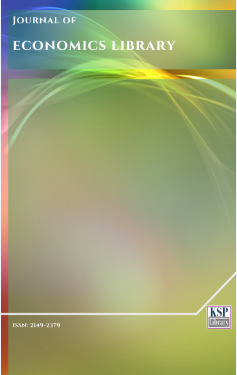International trade and economic growth in Nigeria: An auto regressive and distributed LAG bound test approach
Abstract
Abstract. This paper empirically investigated the impact of international trade on economic growth in Nigeria during the period 1981 – 2017. To achieve the purpose of this research, we estimated real GDP as a function of imports, exports, gross fixed capital formation, unemployment rates and exchange rate. The methods used are: the Autoregressive Distributed Lag (ARDL) techniques, Augmented Dickey- Fuller unit root test, Johansen co-integration test, error correction technique, and the Granger causality test. The empirical results revealed that: all the variables used are integrated of the same order, 1(1) except for unemployment and gross fixed capital formation which were integrated of order 1(0); also, the bound test revealed that there is evidence of the existence of a long run relationship among the variables used; while the causality test revealed that exports granger causes economic growth in Nigeria. Findings revealed that there is short run impact of export trade on economic growth. Also, causality runs from imports and exports to economic growth in Nigeria. Based on these findings, the study therefore recommends among other things that: the government should improve on her trade contents and concentrate on the exportation of labour intensive products and as a result, improve economic performance.
Keywords. Economic growth, Exports, Factor endowment, Imports, ARDL.
JEL. F14, F43.Keywords
References
Abughalia, M., & Abusalem, R. (2013). Libyan foreign trade: A Time series analysis. World Review of Business Research. 3(2), 25-42.
Abula, M., & Ben, D.M. (2016). The impact of public debt on economic development of Nigeria. Asian Research Journal of Arts & Social Sciences, 1(1), 1-16.
Ajayi, F.O., & Atanda, A.A. (2012). Monetary policy and bank performance in Nigeria: A two-step co-integration approach, African Journal of Scientific Research, 9(1), 462-476. doi. doi. 10.18488/journal.aefr.2018.87.853.869
Arodoye, O., & Iyoha, O. (2014). Foreign trade-economic growth nexus: Evidence from Nigeria, CBN. Journal of applied Statistics, 5(1), 25-35.
Atangana, E.M., Adamou, M.S.D., & Njie, P.K. (2017). An empirical analysis of the effects of monetary policy on economic growth in Cameroon. Merit Research Journal of Business and Management, 4(2), 9-17.
Babatunde, A., Jonathan, D.D., & Muhyideen, I.A. (2017). International trade and Nigeria economy. Global Journal of Human-Social Sciences: Economics, 17(5), 29-39.
Balami, D.H. (2006). Macroeconomic Theory and Practice. Salawe Prints: Maiduguri.
Central Bank of Nigeria. (2017). Statistical Bulletin. Central Bank of Nigeria: Abuja
Central Bank of Nigeria. (2011). Monetary Programme: Understanding Monetary Policy. Series, No.1. [Retrieved from].
Emeka, E.J., Ikpesu, F., & Peter, E. (2012). Macroeconomic impact of trade on Nigerian growth: An empirical evaluation. Research Journal of Business Management and Accounting, 1(4), 79-83.
Hameed, G., Khalid, M., & Sabit, R. (2012). Linkage between monetary instruments and economic growth. Universal Journal of Management and Social Sciences, Preston University Islamabad, 2(5), 69-76.
Hassan, C., Olawoye, J., & Nnadozie, K. (2002). International Trade and Multinational Corporations on the Environment and Sustainable Livelihoods of Rural Women in Akwa-Ibom State. AZ Prints: Uyo
Johansen, S. (1988). Statistical analysis of cointegration vectors. Journal of Economic Dynamics and Control, 12(2–3), 231-254. doi. 10.1016/0165-1889(88)90041-3
Li, Y., Chen, Z., & San, C. (2010). Research on the relationship between foreign trade and the GDP growth of East China: Empirical analysis based on causality. Modern Economy, 1(2), 118-124. doi. 10.4236/me.2010.12012
Madichie, C., & Maduka, A. (2014). Financial development and economic growth in Nigeria: A reconsideration of empirical evidence. Journal of Economics and Sustainable Development, 5(28), 199-208.
National Bureau of Statistics (NBS), (2017). Annual Statistical Report. Federal Government of Nigeria: Abuja. [Retrieved from].
National Bureau of Statistics (NBS), (2015). Demographic and Health Survey. Federal Government of Nigeria: Abuja. [Retrieved from].
Ogunmuyiwa, M.S., & Ekone A.F. (2010). Money supply-economic growth nexus in Nigeria. Journal of Social Science, 22(3), 199-204. doi. 10.1080/09718923.2010.11892802
Oyeleye, A. (2014). Lost and found? Globalised neoliberalism and global youth resis‐tance. Critical Arts, 28(1), 57-68. doi. 10.1080/02560046.2014.883689
Sanusi, S.L. (2010). Growth Prospects for the Nigerian Economy. Convocation Lecture Delivered at the Igbinedion University Eighth Convocation Ceremony: Okada
Solow R.M. (1956). A Contribution to the theory of economic growth. The Quarterly Journal of Economics, 70(1), 65-94. doi. 10.2307/1884513
Solow, R.M. (2002). Interview by Douglas Clement. The Region (Federal Reserve Bank of Minneapolis), September: pp.24-34. [Retrieved from].
Stephen, E.A., & Obah, D.O. (2017). The impact of international trade on economic growth in Nigeria: An econometric analysis. Asian Finance & Banking Review, 1(1), 12-30.
Pesaran, M.H., Shin, Y., & Smith, R.J. (2001), Bounds testing approaches to the analysis of level relationships. Journal of Applied Econometrics, 16(3), 289-326. 10.1002/jae.616
Tang, J. (2006). Exports Revenue as Determinant of Economic Growth: Evidence from Botswana. University of Botswana, Botswana.
World Bank, (2019), World bank data report, World Bank, Washington, DC, USA. Accessed in December 8, 2019. [Retrieved from].
World Bank, (2013), World bank data report, World Bank, Washington, DC, USA. Accessed in April 12th, 2018. [Retrieved from].DOI: http://dx.doi.org/10.1453/jel.v7i1.2024
Refbacks
- There are currently no refbacks.
.......................................................................................................................................................................................................................................................................................................................................
Journal of Economics Library - J. Econ. Lib. - JEL - www.kspjournals.org
ISSN: 2149-2379
Editor: jel@ksplibrary.org Secretarial: secretarial@ksplibrary.org Istanbul - Turkey.
Copyright © KSP Library

